How to Create a Privacy Policy for Your Music Website
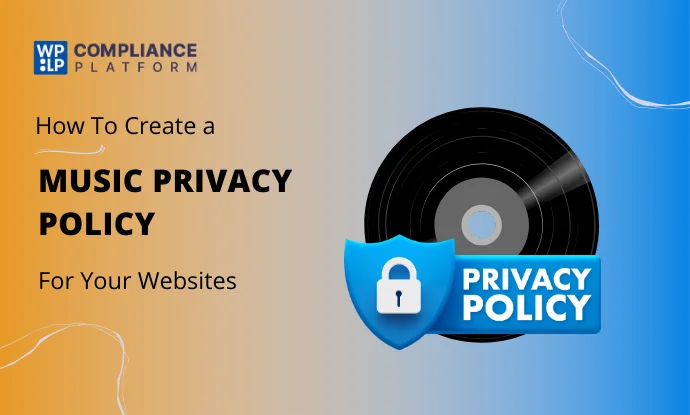
Are you looking to make a privacy policy for your music website?
It is mandatory to create a music privacy policy for music producers and sellers as well as streaming sites.
In addition, it guarantees that you meet the requirements of legislation such as PCI compliance and GDPR. It also establishes the trust of users in data processing.
This article will show you step-by-step instructions on how to make a privacy policy for a music website.
What is a Privacy Policy?
This is a standard clause that specifies how the user’s data will be captured, used, and secured while using the website.
It is evident that this clause communicates with the website users on their data storage, especially as they surf through the website.
This is clinching for the purposes of taking on different privacy laws across the world while building confidence in the users.
A good privacy policy gives information about:
- What data do you gather (email addresses, payment details, etc.)?
- What processes do you use to gather it (forms, cookies, or use of tracking)
- For what purpose do you use that data (for marketing purposes, enhancement of services, etc.)
- How users may manage their data on the website: access, amend, or erase it.
Global Privacy Laws Affecting Music Websites
Privacy laws are important for every site, including music sites, because they dictate how private information is gathered, kept, and used. Below are some important privacy policies for music websites:
1. General Data Protection Regulation (GDPR)
Territoriality: The European Union (EU), the European Economic Area (EEA).
Coverage: Covers any website that deems it necessary to collect personal information from users located in several regions of the EU, irrespective of the location of the headquarters of the website.
Key Requirements:
- User’s Consent: Websites are required to obtain informed consent from users before they are allowed to collect any user private information. This usually entails having a cookie consent banner and opt-in forms.
- Website Transparency: Users need to be notified in advance of what information is to be collected, what its purpose is, and what the duration of retention will be. Data transparency should be properly detailed in the Privacy Policy.
- Data Subject Rights: Users can access their information; change any incorrect information, delete all or a portion of their records as well as transfer it elsewhere. They can revoke consent at any moment.
- Protection of Personal Data: Measures should be put in place to ensure that personal user data is secured from illegal access or misuse.
- Breach Notification: If a data breach occurs, the website is obliged to take action and inform its users and third-party authoritative bodies within a period of 72 hours.
- Fines: Failure to comply with laws may lead to penalties up to 4% of the global revenue of the entity or €20 million, whichever is higher.
2. California Consumer Privacy Act (CCPA) / California Privacy Rights Act (CPRA)
Jurisdiction: California, United States.
Scope: This applies to any company that holds business data of residents of California. Such businesses operate above a stipulated level of revenue or volume of data that is collected.
Key Requirements:
- Right to know: Consumers are entitled to reign over their personal data, including its collection, purpose, and sharing.
- Right to Delete: Consumers are allowed to delete their personal data held by businesses with some exclusions.
- Right to Object: The users should have the option to prohibit their data from being sold or shared with other businesses for benefits.
- Data Accessibility: The users should be able to download their data and choose to transfer it to another service.
- Privacy Notices: Privacy notices for music websites have to be placed on the websites detailing the user’s rights and how personal data will be treated.
- Non-Discrimination: Authorized CCPA users should not be denied services or charged a higher price for any kind of services offered by the website.
3. Children’s Online Privacy Protection Act (COPPA)
Jurisdiction: The United States of America.
Scope: This applies to websites or online services that are directed at or that collect personal information of children below 13 years of age.
Key Requirements:
- Parental Consent: It is necessary for all websites to get parental consent before gathering any data about a child under the age of 13.
- Privacy Policy: A privacy policy for music websites that details how children’s information is harvested, processed, and disseminated is a requirement.
- Data Retention: all personal information that was acquired from children should be eliminated if there is no further use for the information.
- Penalties: Noncompliance with COPPA can lead to substantial fines of up to $43,280 for every contravention.
4. Federal Trade Commission (FTC) Act (for U.S. sites)
Jurisdiction: United States of America
Scope: The FTC underscores laws that protect consumers, including privacy laws.
Key Requirements:
- Truth in Advertising: All websites ought to provide adequate information on their data collection policies and practices on the use of the data collected.
- Children’s Privacy: COPPA should sanction any kind of web publishing and data collection from children under 13 years.
- Privacy Policy: The FTC requires that a privacy notice be put in place and that these websites meet the legally required statutes, including CCPA and COPPA.
- Penalties: If organizations do not comply with data privacy regulations, they risk hefty fines and possible litigation.
5. Brazilian General Data Protection Law (LGPD)
Jurisdiction: Brazil
Scope: LGPD is Brazil’s GDPR model that applies to companies that carry out operations in Brazil using the personal data of residents in Brazil.
Key Requirements:
- Consent: Under GDPR, consent is compulsory before collecting personal data, and informing the purpose of processing the data is mandatory.
- Data Subject Rights: Users have a right to access, rectify, delete, and port their data.
- Privacy Policy: Clear policies on privacy and the protection of personal data must be provided.
- Data Protection Officer: It is likely that a data protection officer (DPO) will need to manage the firm with data protection requirements.
- Fines: Breaches that are non-compliant have severe repercussions, which include significant fines imposed (2% of the company’s turnover in Brazil, capped at 50 million BRL for every breach).
6. Personal Data Protection and Privacy Act, 2019 (PDPPA)
Jurisdiction: India
Scope: pertains to businesses that deal with the personal data of Indian users or operate within the Indian territory.
Key Requirements:
- Consent: No processing of personal data without the affirmative action of the user authorizing it.
- Right to Erasure: The data subject can ask to delete such data.
- Transparency: All websites must disclose the way and purpose for which personal data will be processed and used.
- Cross-Border Data Transfer: Tough restrictions with respect to the movement of personal data to other countries outside India
- Penalties: Noncompliance is punishable by fines.
7. Canada’s Personal Information Protection and Electronic Documents Act (PIPEDA)
Jurisdiction: This applies to the Canadian continent as a whole
Scope: This applies to all companies that are known to obtain any type of personal information from people residing in Canada.
Key Requirements:
- Consent: To collect personal or any information regarding a particular person, all businesses should have the permission of that individual.
- Data Subject Rights: The right to access or request amendment of the respective person’s identifiable records.
- Data Protection: The business in question would have to ensure that there are policies and procedures in place to guarantee the confidentiality of personal information.
- Penalties: It is possible for businesses to receive sanctions or be summoned to a court of law for not following the laws that are in place.
8. Asia-Pacific Economic Cooperation (APEC) Privacy Framework
Jurisdiction: This is a regional framework that encompasses the member countries situated in the Asia Pacific region.
Scope: This is inclusive of businesses that have an APEC presence, such as those that are based in Australia, Japan, and Singapore, among other countries.
Key Requirements: The APEC framework appears as guidance for privacy of data protection against abuse in all cross-border data flows and provides limits across the three crosslinks: the protection of data users and privacy, accountability, and transparency of the data.
Penalties: The framework, as it is, does not stipulate fines; however, member countries that endorse working in APEC have other penalties.
How to Make a Privacy Policy for Your Music Website?
Given the significance of a privacy policy, are you wondering how to write one that is applicable to your music website?
If it’s a YES, then creating a privacy policy is quite easy.
In fact, writing one manually can be tedious, so we recommend that you resort to the WP Legal Pages plugin. It’s a free privacy policy generator that allows you to do all the work hands-off.
This eCommerce privacy policy ensures the protection of user data for all online transactions and activities conducted on the music website.
The plugin provides you with ready-made templates that you can edit to customize the page. This will create a custom legal page for you.
WP Legal Pages – Free Privacy Policy Generator

WP Legal Pages is a free privacy policy generator that is useful in drafting a privacy policy for a music website within the shortest time possible.
The plugin assists you in preparing a standard document on privacy policy that is appropriate for the site.
WP Legal Pages Plugins provides more than 30 templates for pre-designed policies such as privacy policy, disclaimer, terms and conditions.
Step 1: Installing the WP Legal Pages Plugin
Open WP admin, then go to Dashboard > Plugins > Add new.

Type WPLegalPages in the search bar
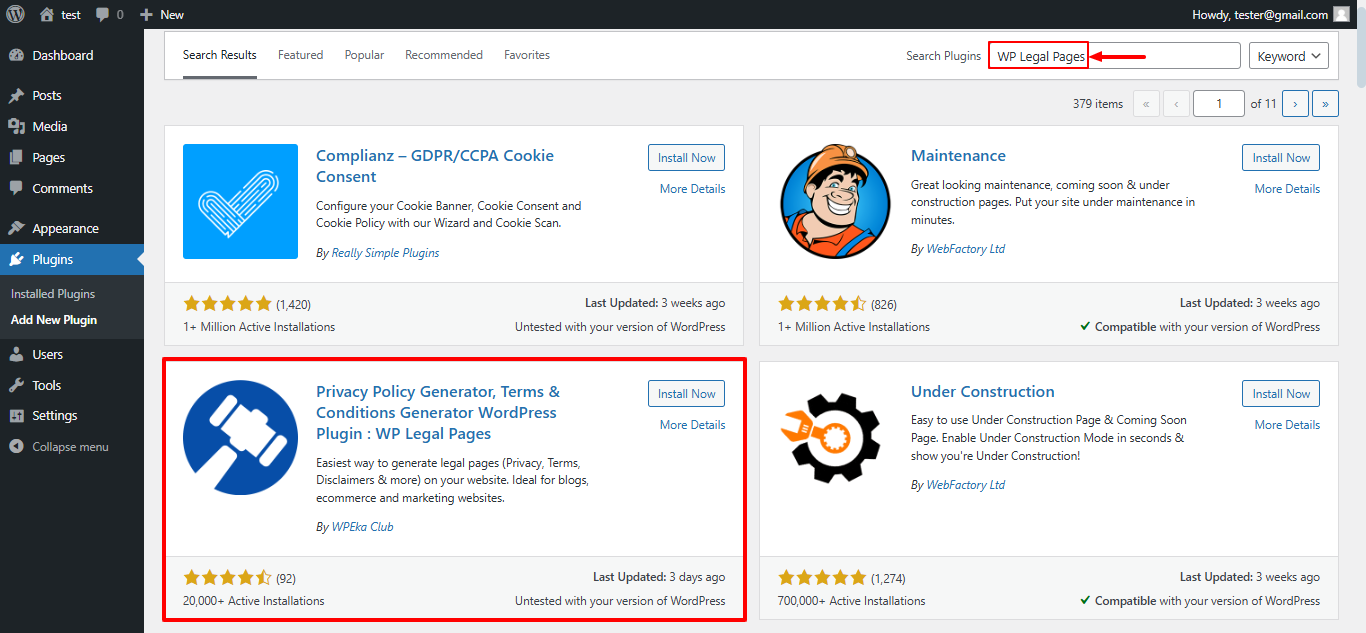
Install the Privacy Policy Generator Plugin using WP legal Pages.
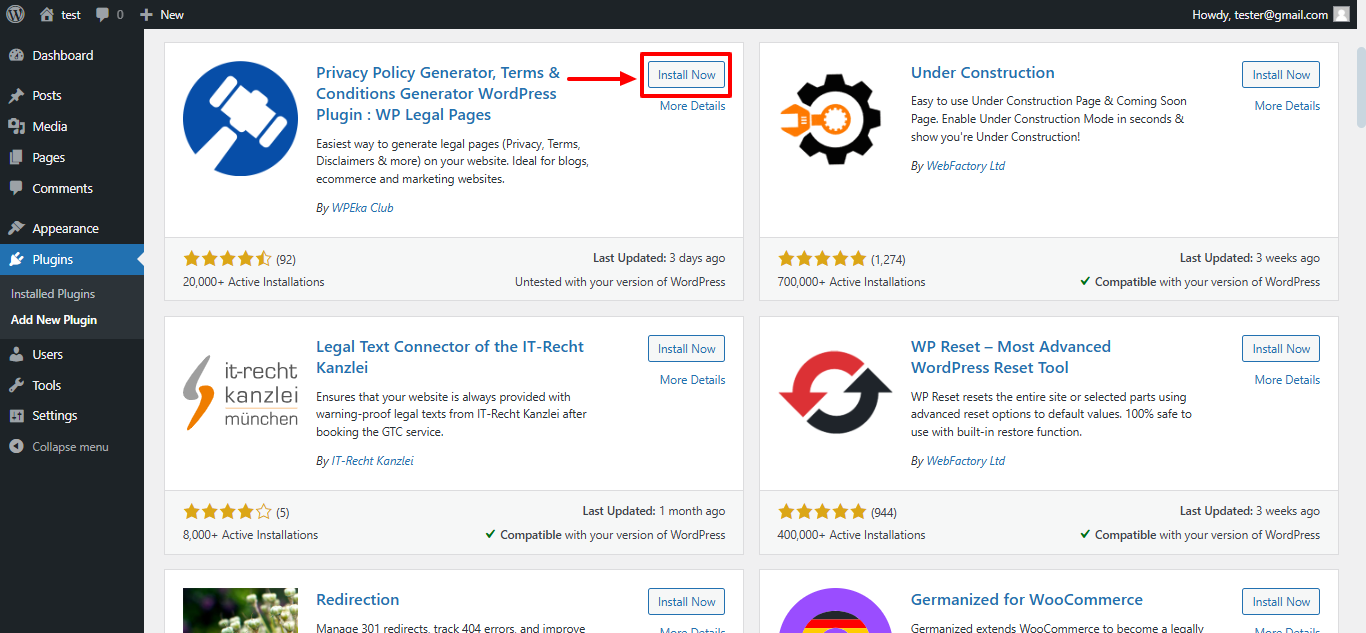
To enable the WP Legal Pages plugin, click on the Activate button.
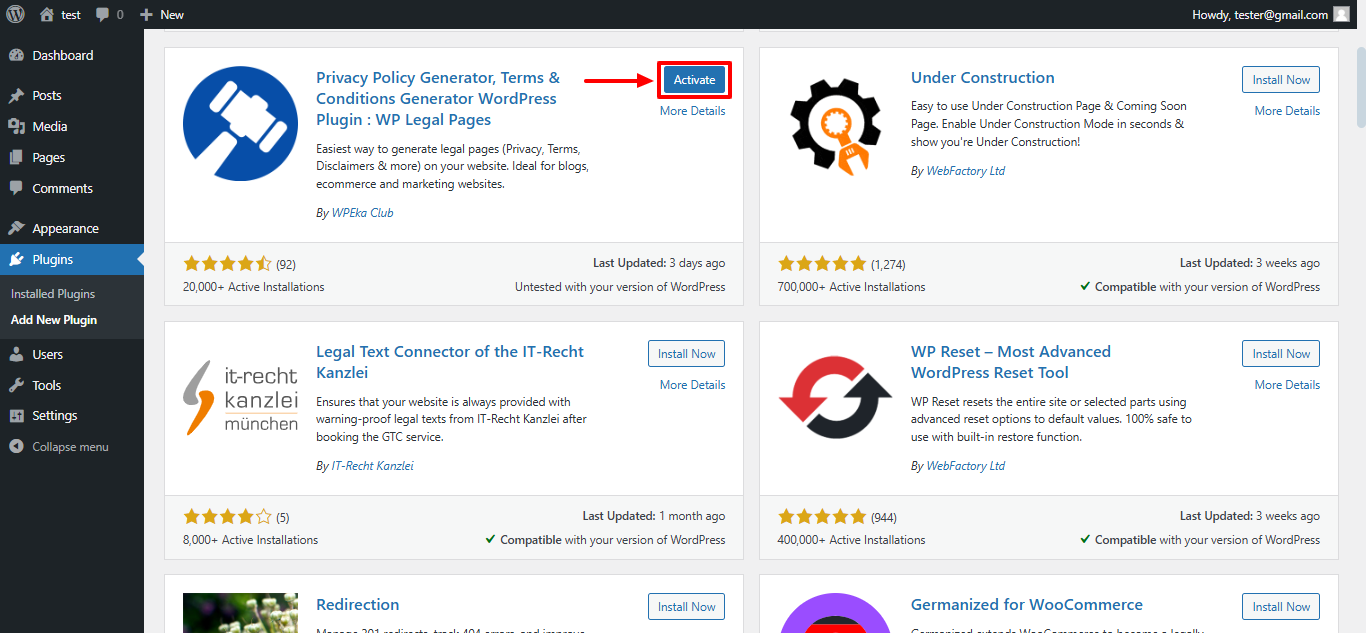
That’s it! You’ve managed to successfully install and also activate WP Legal Pages plugin. Next we turn to drafting a privacy policy for your music website.
Step 2: Setting Up WP Legal Pages Plugin
Once you activate the plugins, access them from your Dashboard.
From your dashboard, find the WPLegalPages tab and press the Accept button to generate your legal pages.
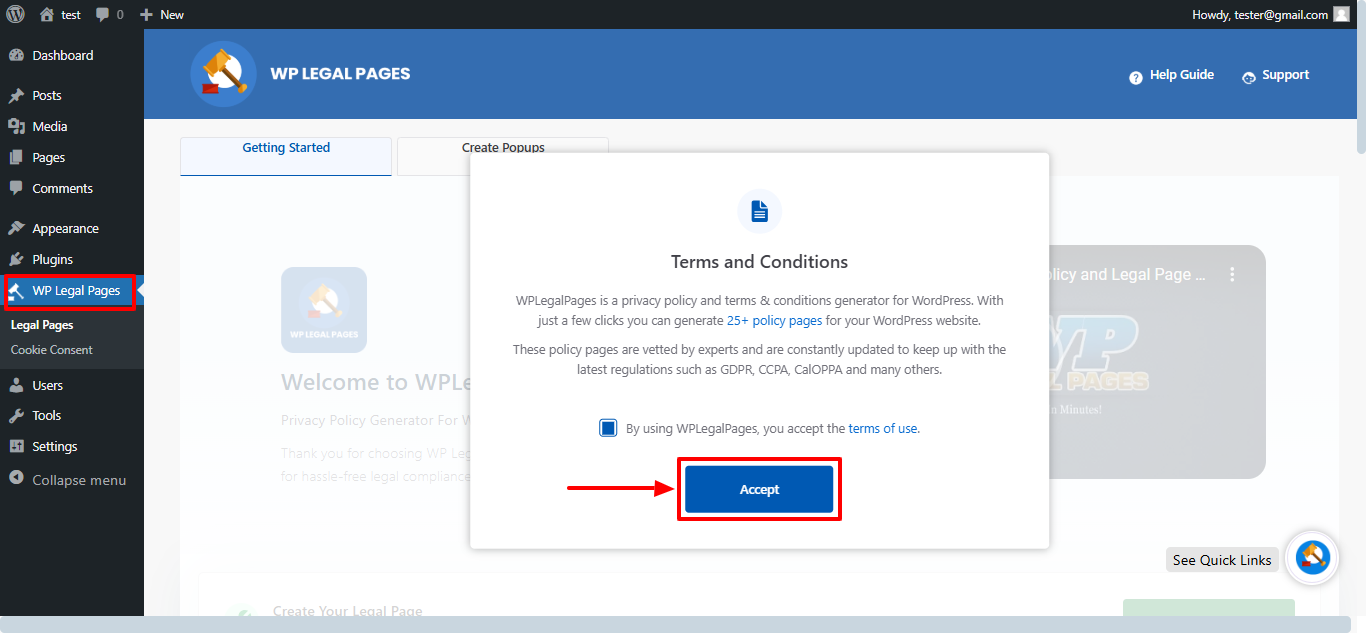
Step 3: Drafting a Privacy Policy for a Music Website
To start off, contemplate in what form you want to draft your privacy policy for a music website. Click Create Legal Page and make a choice.
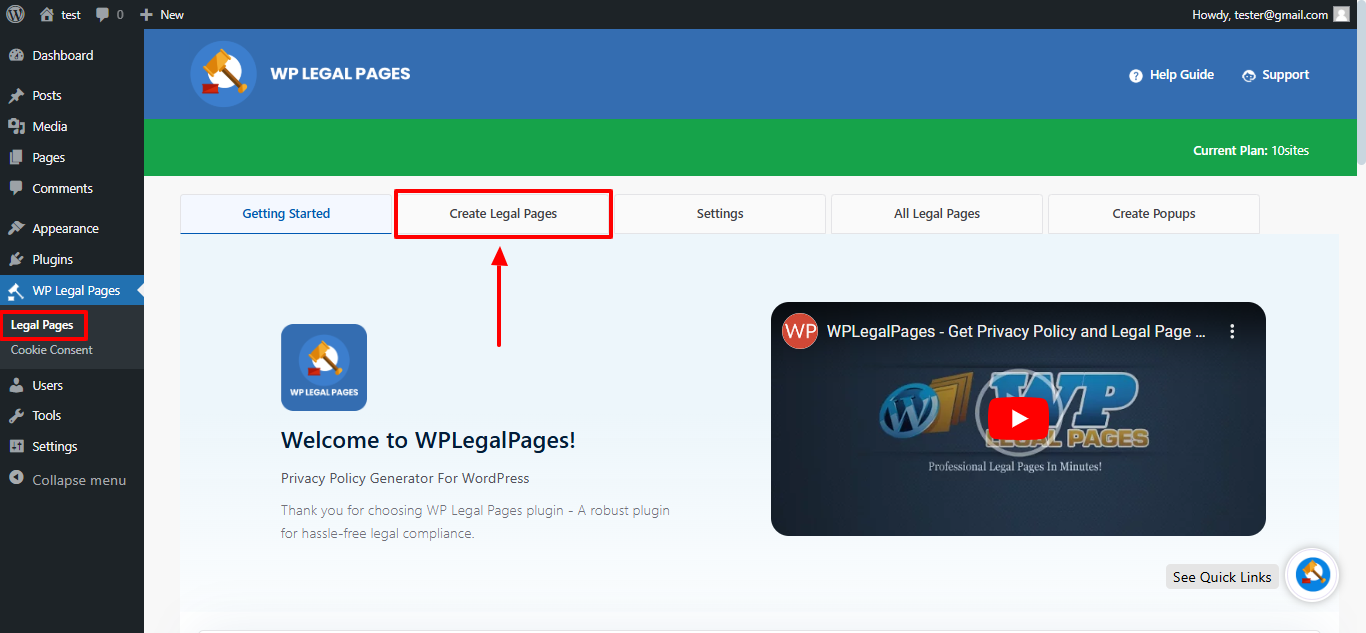
The free version has four templates available. Select the Standard Privacy Policy option to create a Privacy Policy statement for your music website.
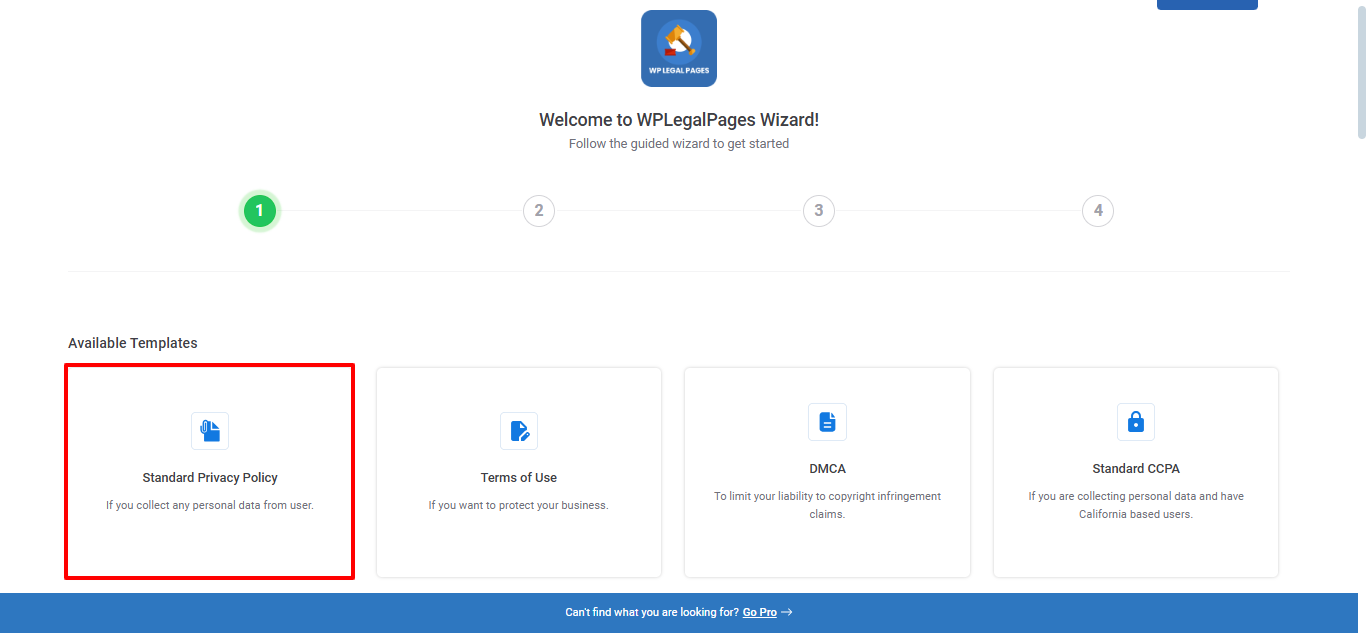
Click on Connect your existing website.
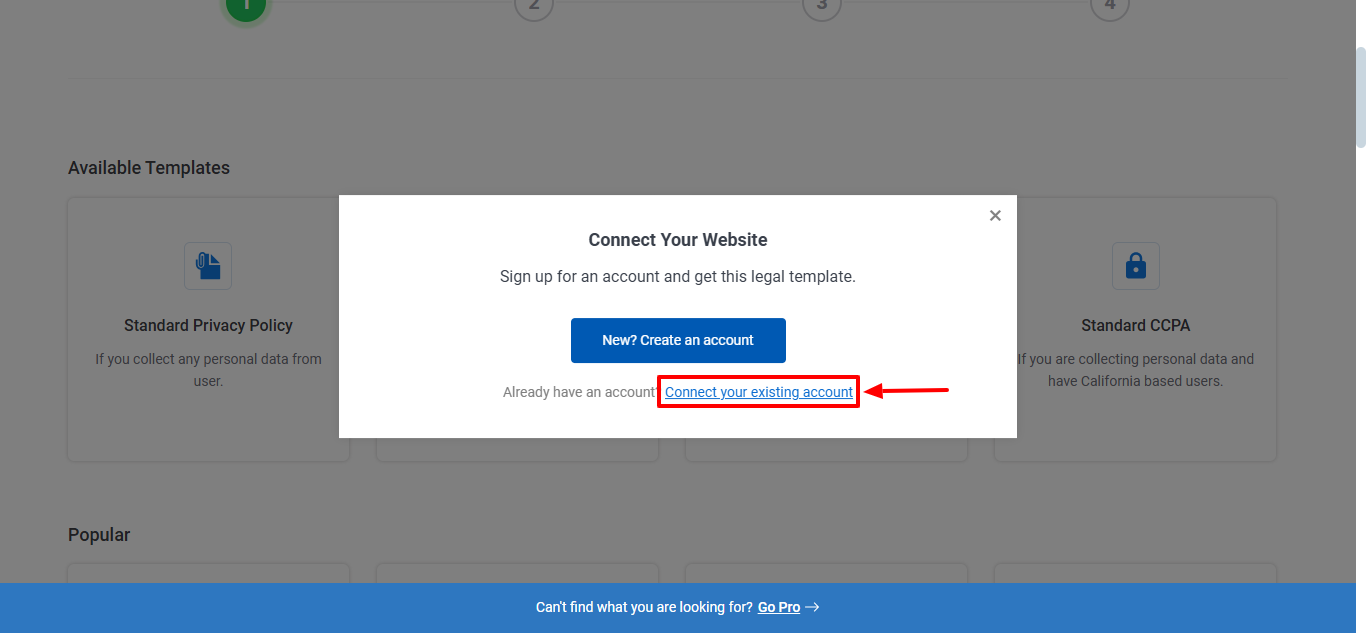
Log in and connect your existing website
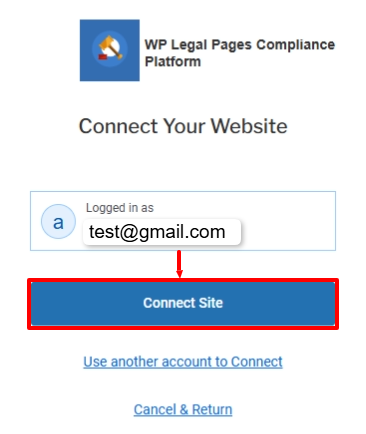
Please fill in the Basic Details and click Next.

Pick your desired section from your legal policy and press the Next button.
You will see the preview of your privacy policy template here.
Step 4: Personalize Your Music Privacy Policy Draft.
To revise your privacy policy or make any changes, click on Create and Edit.
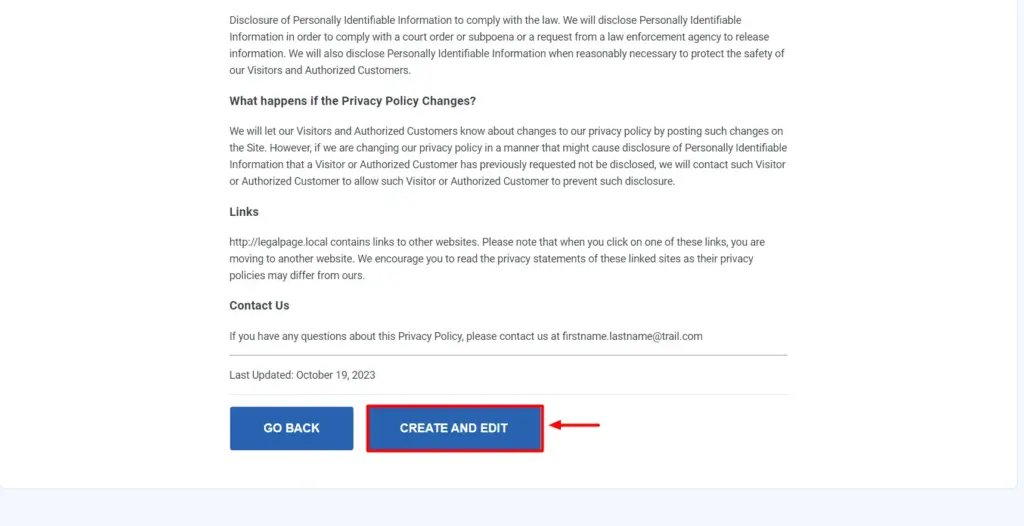
Now that your music privacy policy has been updated click on publish to get your final review.
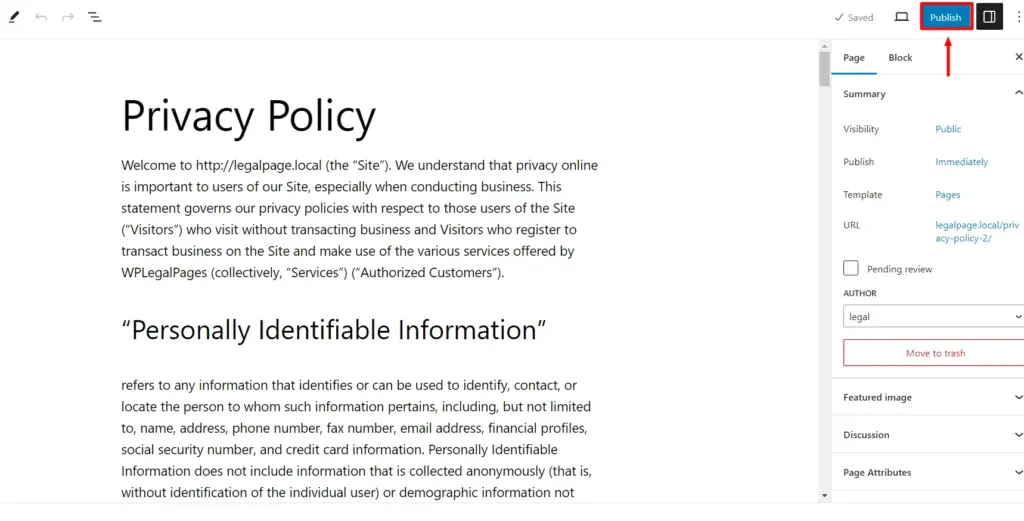
So there you go! Only a few clicks are required to create your data privacy statement.
Where Should You Post the Privacy Policy of Your Music Website?
Your users should be able to access the privacy policy without much hassle. Such policies are usually found in the following areas:
- The footer of Every Page: Let the footer of every page contain a link to the policy so that it appears at all times.
- Signup/Login Pages: If you have registrations or logins, and this process is a source of user data then a link to privacy policy should be included here.
- Checkout Pages: If you buy and sell music working with user’s data, let users of your site read your policy when they are in the process of checking out.
FAQ
Yes, you can write your privacy policy. However, the policy should still follow the appropriate regulations, such as GDPR or CCPA, in accordance with the region of your users.
There are a lot of free resources, and privacy policy generators one can search through to aid them in writing a music privacy policy.
To properly complete the music privacy policy template, it is critical to outline the information that the site gathers as well as how the information will be applied. Another alternative is to use a privacy policy generator instead.
Yes, a privacy policy is mandatory in such cases especially if you are collecting information from your users, a simple email address, for instance, is basis enough to warrant a policy.
While a free privacy policy generator might be helpful, it is critical for you to ensure that the privacy policy for a music website encompasses all the core aspects of data protection that are pertinent to your music website.
Conclusion
A music privacy policy is very important, especially if one runs such a website and collects visitor’s personally identifiable information.
On the subject of privacy policies, and as stated earlier, it is imperative that your privacy policy be easy to find on your website.
You can achieve this by positioning it strategically on your site. When it comes to gathering sensitive data from users, it is evident how important a privacy policy is not just to them but also to the law.
We recommend you use the WP Legal Pages plugin to create a music privacy policy.
This tool is designed to help you comply with privacy regulations, but you can also make a customized privacy policy for your music website in a matter of minutes by using its functionalities.
If you liked reading this article, don’t forget to read our other engaging articles:
- Best Privacy Policy Generators For Your Website
- How to Create a Privacy Policy For Gym Website
- How to Create a Privacy Policy For a Hotel Website
Are you excited to create a privacy policy for your music website? Grab WPLP Compliance Platform now!
